- Utility Menu
- ARC Scheduler
- Student Employment
- Senior Theses
Doing a senior thesis is an exciting enterprise. It’s often the first time students are engaging in truly original research and trying to develop a significant contribution to a field of inquiry. But as joyful as an independent research process can be, you don’t have to go it alone. It’s important to have support as you navigate such a large endeavor, and the ARC is here to offer one of those layers of support.
Whether or not to write a senior thesis is just the first in a long line of questions thesis writers need to consider. In addition to questions about the topic and scope of your thesis, there are questions about timing, schedule, and support. For example, if you are collecting data, when should data collection start and when should it be completed? What kind of schedule will you write on? How will you work with your adviser? Do you want to meet with your adviser about your progress once a month? Once a week? What other resources can you turn to for information, feedback, and support?
Even though there is a lot to think about and a lot to do, doing a thesis really can be an enjoyable experience! Keep reminding yourself why you chose this topic and why you care about it.
Tips for Tackling Big Projects:

Break the process down into manageable chunks.
- When you’re approaching a big project, it can seem overwhelming to look at the whole thing at once, so it’s essential to identify the smaller steps that will move you towards the completed project.
- Your adviser is best suited to help you break down the thesis process with field-specific advice.
- If you need to refine the breakdown further so it makes sense for you, schedule an appointment with an Academic Coach . An academic coach can help you think through the steps in a way that works for you.
Schedule brief writing sessions at regular times.
- Pre-determine the time, place, and duration.
- Keep it short (15 to 60 minutes).
- Have a clear and reasonable goal for each writing session.
- Make it a regular event (every day, every other day, MWF).
- time is not wasted deciding to write if it’s already in your calendar;
- keeping sessions short reduces the competition from other tasks that are not getting done;
- having an achievable goal for each session provides a sense of accomplishment (a reward for your work);
- writing regularly can turn into a productive habit.
Create accountability structures.
- In addition to having a clear goal for each writing session, it's important to have clear goals for each week and to find someone to communicate these goals to, such as your adviser, a “thesis buddy,” your roommate, etc. Communicating your goals and progress to someone else creates a useful sense of accountability.
- If your adviser is not the person you are communicating your progress to on a weekly basis, then request to set up a structure with your adviser that requires you to check in at less frequent but regular intervals.
- Commit to attending Accountability Hours at the ARC on the same day every week. Making that commitment will add both social support and structure to your week. Use the ARC Scheduler to register for Accountability Hours.
- Set up an accountability group in your department or with thesis writers from different departments.
Create feedback structures.
- It’s important to have a means for getting consistent feedback on your work and to get that feedback early. Work on large projects often lacks the feeling of completeness, so don’t wait for a whole section (and certainly not the whole thesis) to feel “done” before you get feedback on it!
- Your thesis adviser is typically the person best positioned to give you feedback on your research and writing, so communicate with your adviser about how and how often you would like to get feedback.
- If your adviser isn’t able to give you feedback with the frequency you’d like, then fill in the gaps by creating a thesis writing group or exploring if there is already a writing group in your department or lab.
- The Harvard College Writing Center is a great resource for thesis feedback. Writing Center Senior Thesis Tutors can provide feedback on the structure, argument, and clarity of your writing and help with mapping out your writing plan. Visit the Writing Center website to schedule an appointment with a thesis tutor .
Accept that there will be some anxious moments.
- To reduce this source of anxiety, try keeping a separate document where you jot down ideas on how your research questions or central argument might be clarifying or changing as you research and write. Doing this will enable you to stay focused on the section you are working on and to stop worrying about forgetting the new ideas that are emerging.
- You might feel anxious when you realize that you need to update your argument in response to the evidence you have gathered or the new thinking your writing has unleashed. Know that that is OK. Research and writing are iterative processes – new ideas and new ways of thinking are what makes progress possible.
- Breaking down big projects into manageable chunks and mapping out a schedule for working through each chunk is one way to reduce this source of anxiety. It’s reassuring to know you are working towards the end even if you cannot quite see how it will turn out.
- It may be that your thesis or dissertation never truly feels “done” to you, but that’s okay. Academic inquiry is an ongoing endeavor.
Focus on what works for you.
- Just because your roommate wrote 10 pages in a day doesn’t mean that’s the right pace or strategy for you.
- If you are having trouble figuring out what works for you, use the ARC Scheduler to make an appointment with an Academic Coach , who can help you come up with daily, weekly, and semester-long plans.
Use your resources.
- There’s a lot of the thesis writing process that has to be done independently, but there are also a lot of free resources at Harvard to help you do the work.
- If you’re having trouble finding a source, email your question or set up a research consult via Ask a Librarian .
- If you’re looking for additional feedback or help with any aspect of writing, contact the Harvard College Writing Center . The Writing Center has Senior Thesis Tutors who will read drafts of your thesis (more typically, parts of your thesis) in advance and meet with you individually to talk about structure, argument, clear writing, and mapping out your writing plan.
- If you need help with breaking down your project or setting up a schedule for the week, the semester, or until the deadline, use the ARC Scheduler to make an appointment with an Academic Coach .
- If you would like an accountability structure for social support and to keep yourself on track, come to Accountability Hours at the ARC.
Accordion style
- Assessing Your Understanding
- Building Your Academic Support System
- Common Class Norms
- Effective Learning Practices
- First-Year Students
- How to Prepare for Class
- Interacting with Instructors
- Know and Honor Your Priorities
- Memory and Attention
- Minimizing Zoom Fatigue
- Note-taking
- Office Hours
- Perfectionism
- Scheduling Time
- Study Groups
- Tackling STEM Courses
- Test Anxiety
Yale College Undergraduate Admissions
- A Liberal Arts Education
- Majors & Academic Programs
- Teaching & Advising
- Undergraduate Research
- International Experiences
- Science & Engineering Faculty Features
- Residential Colleges
- Extracurriculars
- Identity, Culture, Faith
- Multicultural Open House
- Virtual Tour
- Bulldogs' Blogs
- First-Year Applicants
- International First-Year Applicants
- QuestBridge First-Year Applicants
- Military Veteran Applicants
- Transfer Applicants
- Eli Whitney: Nontraditional Applicants
- Non-Degree & Alumni Auditing Applicants
- What Yale Looks For
- Putting Together Your Application
- Selecting High School Courses
- Application FAQs
- First-Generation College Students
- Rural and Small Town Students
- Choosing Where to Apply
- Inside the Yale Admissions Office Podcast
- Visit Campus
- Virtual Events
- Connect With Yale Admissions
- The Details
- Estimate Your Cost
- QuestBridge
Search form
Writing a senior thesis: is it worth it.
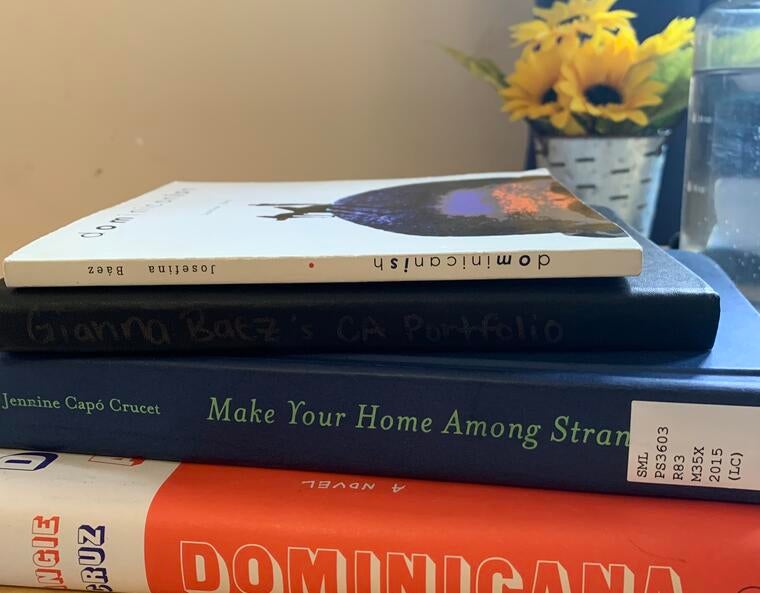
Before coming to Yale, I thought a thesis was the main argument of a paper. I quickly learned that an undergraduate thesis is about fifty times harder and fifty pages longer than any thesis arguments I wrote in high school. At Yale, every senior has some sort of senior requirement, but thesis projects vary by department. Some departments require students to do a semester-long project, where you write a longer paper (25-35 pages) or expand, through writing, the research you’ve been working on (mostly applies to STEM majors). In some departments you can take two senior seminars and complete a longer project at the end of the semester. And other departments have an option to complete a year-long thesis: you spend your senior year (and in some cases your junior year), intensely researching and writing about a topic you choose or create yourself.
Both my departments––English and Ethnicity, Race, and Migration––offer all three of these options, and each student decides what they think is best for them. As a double major, I had the additional option to write an even longer thesis combining both my majors, but that seemed like way too much work––especially since I would have to take two senior thesis classes at the same time. Instead, I chose a year-long thesis for ER&M that combined my literary interests with various theoretical frameworks and the two senior seminars for English. This spring I’m taking my second seminar. Really, I chose the option to torture myself for a whole year, the end result being a minimum of 50 pages of innovative thinking and writing. I wanted to rise to the challenge, proving to myself I could do it. But there also seemed to be the pressure of “this is what everyone in the major does,” and a “thesis is proof that you actually learned.” Although these sentiments influenced my decision to complete a thesis, I know a long research paper does not validate my education or work as a scholar the last four years. It is not the end all be all.
My senior thesis focuses on Caribbean literature - specifically, two novels written by Caribbean women that really look at what it means to come from an immigrant family, to move, and to find yourself in completely new spaces. These experiences are all too relatable to my own life as a second-generation woman of color with immigrant parents enrolled at Yale. In my writing, I focus on how these women make sense of “home” (a very broad and complicated topic, I know), and what their stories tell us about the diasporic experience in general. The project is very personal to me, and I chose it because I wanted to understand my family’s history and their task in making “home” in the U.S., whatever that means. But because it’s so personal, it’s also been really difficult. I’ve experienced a lot of writer’s block or often felt unmotivated and judgmental towards my work. I’ve realized how difficult it is to devote your time and energy to such a long process––not only is it research heavy, but you have to write and rewrite drafts, constantly adjusting to make sure you’re being as clear as possible. Really, writing a thesis is like writing a portion of a book. And that’s crazy! You’re writing two or three whole chapters of academic work as an undergraduate student.
The process is definitely not for everyone, and I’ve certainly thought “Why did I want to do this again?” But what’s really kept me going is the support from my advisors and friends. The ER&M department faculty does an amazing job of providing us mentorship, revisions, and support throughout the process; my advisor has served as my editor but also the person who reminds me most that this work is important, as I often forget that. It also helps to have many friends and people in the major also writing their theses. I’ve found different spaces to just have a thesis study hall or working time, with other people also struggling through. Recently, I submitted my first full draft (note: it was kind of unfinished but it’s okay because it’s a draft!), and it was crazy to think that I wrote 50+ pages, most of which are just my own original thoughts and analysis on two books that have almost no scholarship written about them. It was a relief for sure. This week I will be taking a full break from it, but it reminded me of why I began this journey. It reminded me of all the people who’ve supported me along the way, and how I really couldn’t have done it without them. And now, I’m really looking forward to how good it will feel to turn in my fully written thesis mid-April. I’ve realized that this project shouldn’t be about making it good for Yale’s standard, but for myself, for my family, and for the people who believe in this work as much as I do.
More Posts by Gianna

Senior Bucket List: All the things I had to do before I left Yale/New Haven
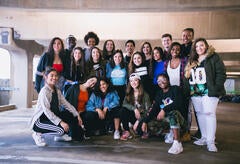
Meet Rhythmic Blue!

Medieval Manuscripts and the Beinecke Library
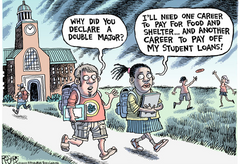
How I Navigated My Double Major

Rating Boba in New Haven

Quarantine Birthdays

Welcome to the Trumbutt!!!!

Yale IMs: Intramural Sports #MOORAH
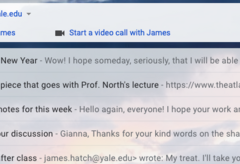
Reimagining Virtual Relationships

- Utility Menu
- Writing Center
- Writing Program
- Senior Thesis Writing Guides
The senior thesis is typically the most challenging writing project undertaken by undergraduate students. The writing guides below aim to introduce students both to the specific methods and conventions of writing original research in their area of concentration and to effective writing process.
- Brief Guides to Writing in the Disciplines
- Course-Specific Writing Guides
- Disciplinary Writing Guides
- Gen Ed Writing Guides
Important Addresses

Harvard College
University Hall Cambridge, MA 02138
Harvard College Admissions Office and Griffin Financial Aid Office
86 Brattle Street Cambridge, MA 02138
Social Links
If you are located in the European Union, Iceland, Liechtenstein or Norway (the “European Economic Area”), please click here for additional information about ways that certain Harvard University Schools, Centers, units and controlled entities, including this one, may collect, use, and share information about you.
- Application Tips
- Navigating Campus
- Preparing for College
- How to Complete the FAFSA
- What to Expect After You Apply
- View All Guides
- Parents & Families
- School Counselors
- Información en Español
- Undergraduate Viewbook
- View All Resources
Search and Useful Links
Search the site, search suggestions, alert: harvard yard closed to the public.
Please note, Harvard Yard gates are currently closed. Entry will be permitted to those with a Harvard ID only.
Last Updated: May 03, 11:02am
Open Alert: Harvard Yard Closed to the Public
Preparing for a senior thesis.
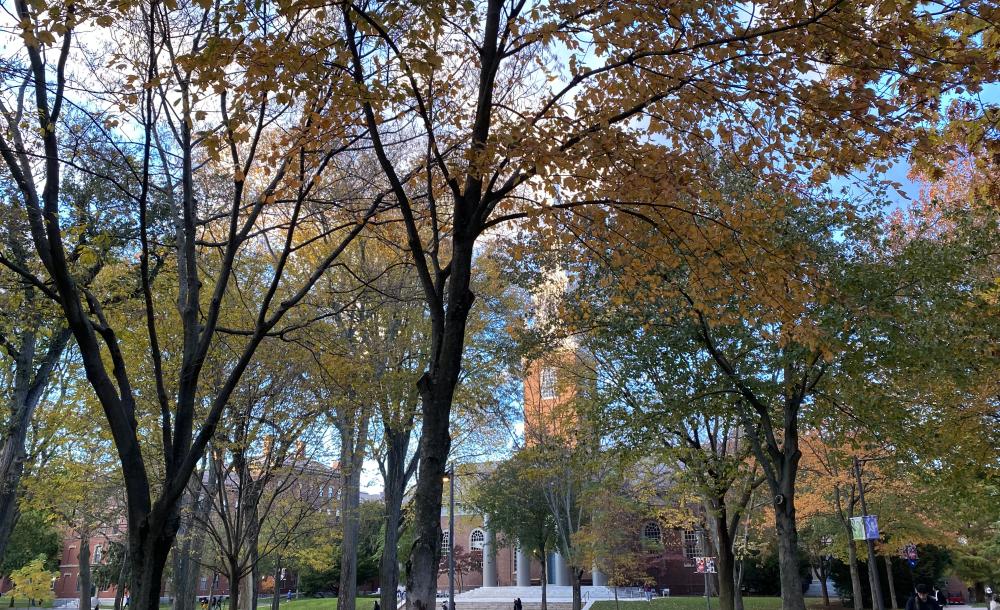
Every year, a little over half of Harvard’s senior class chooses to pursue a senior thesis. While the senior thesis looks a little different from field to field, one thing remains the same: completion of a senior thesis is a serious and challenging endeavor that requires the student to make a genuine intellectual contribution to their field of interest.
The senior thesis is a significant task for students to undertake, but there is a variety of support resources available here at Harvard to ensure that seniors can make the best of their senior thesis experience.
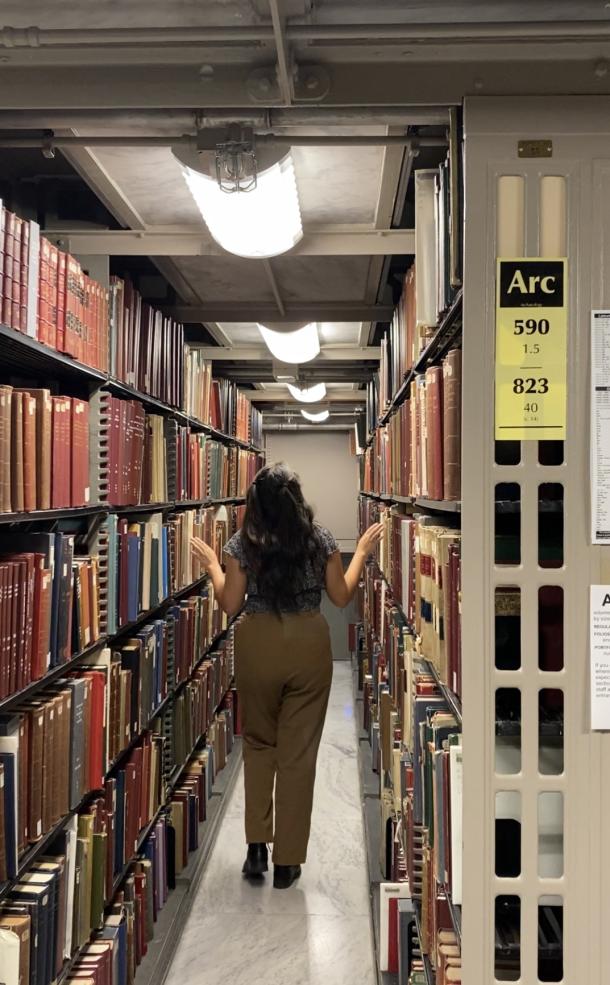
Wandering the library stacks at Widener.
I do most of my research in Widener Library. Hannah Martinez
As a rising senior in the History department, I am planning on pursuing a senior thesis on the history and use of the SAT in college admissions, and I am using the following support systems and resources to research and write my thesis:
- Staff at the History department. Every student within the department is assigned an academic advisor, who is a graduate student studying History at Harvard and knows the support available within the department. My academic advisor has helped me throughout the thesis process by connecting me with potential faculty members to advise my thesis and pick classes with a lighter course load so I can focus on completing my thesis. The Director of Undergraduate Studies in History (the History DUS) has also been pivotal in making sure that I attended a lot of information sessions about what the thesis looks like and how much of a commitment it is.
- History faculty at Harvard! All of my professors in History have been incredibly helpful in teaching me how to write like a historian, how to use primary sources in my essays, and how to undertake a serious research project over the course of a semester. Of course, while the thesis will require me to go far beyond what I’ve ever done before, I feel prepared to take on such a task because of the unwavering support from the History faculty. My mentor, Emma Rothschild, is one of the members of the faculty who has been invaluable in encouraging me to go as far as I am able.
- And last but certainly not least: funding. Funding, whether in term-time of the summer before senior year, is crucial towards making the senior thesis possible. Harvard’s Office of Undergraduate Research and Fellowships is dedicated to connecting Harvard students to funding sources across the university so they can pursue their research and get paid for it. This summer, I received a grant from the university of almost $2,000 so I am able to travel to libraries, buy books, and potentially take time off of work and do my research. Without such a grant, it would be incredibly difficult for me to do enough research so I can write a thesis this upcoming fall.
As you can see, there are multiple avenues for support and resources here at Harvard so your senior thesis is as easy as possible. While the senior thesis is still a challenging project that will take up a lot of time, Harvard’s resources make it possible for senior students to do their very best in all of their theses. I’m excited to start writing this fall!
Hannah Class of '23 Alumni
Hello! My name is Hannah, and I am a rising senior at Harvard concentrating in History from southeast Los Angeles County.
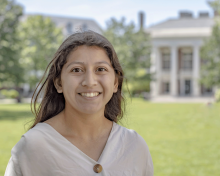
Student Voices
My unusual path to neuroscience, and research.
Raymond Class of '25
How the Mellon Mays Undergraduate Fellowship Propelled My Love of Archives into Academic Aspirations
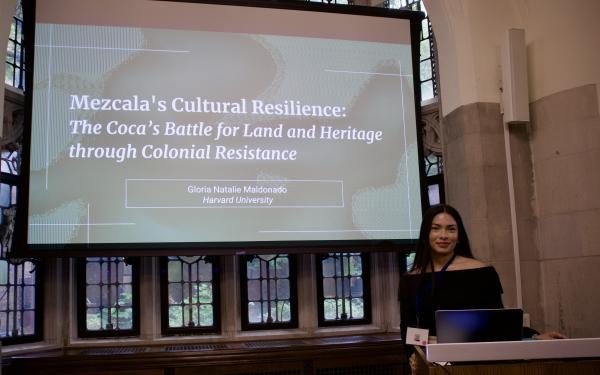
Beginning my senior thesis: A personal commitment to community and justice
Amy Class of '23 Alumni

Senior Thesis
A senior thesis is more than a big project write-up. It is documentation of an attempt to contribute to the general understanding of some problem of computer science, together with exposition that sets the work in the context of what has come before and what might follow. In computer science, some theses involve building systems, some involve experiments and measurements, some are theoretical, some involve human subjects, and some do more than one of these things. Computer science is unusual among scientific disciplines in that current faculty research has many loose ends appropriate for undergraduate research.
Senior thesis projects generally emerge from collaboration with faculty. Students looking for senior thesis projects should tell professors they know, especially professors whose courses they are taking or have taken, that they are looking for things to work on. See the page on CS Research for Undergrads . Ideas often emerge from recent papers discussed in advanced courses. The terms in which some published research was undertaken might be generalized, relaxed, restricted, or applied in a different domain to see if changed assumptions result in a changed solution. Once a project gets going, it often seems to assume a life of its own.
To write a thesis, students may enroll in Computer Science 91r one or both terms during their senior year, under the supervision of their research advisor. Rising seniors may wish to begin thinking about theses over the previous summer, and therefore may want to begin their conversations with faculty during their junior spring—or even try to stay in Cambridge to do summer research.
An information session for those interested in writing a senior thesis is held towards the end of each spring semester. Details about the session will be posted to the [email protected] email list.
Students interested in commercializing ideas in their theses may wish to consult Executive Dean Fawwaz Habbal about patent protection. See Harvard’s policy for information about ownership of software written as part of your academic work.
Thesis Supervisor
You need a thesis supervisor. Normally this is a Harvard Computer Science faculty member. Joint concentrators (and, in some cases, non-joint concentrators) might have a FAS/SEAS Faculty member from a different field as their thesis supervisor. Exceptions to the requirement that the thesis supervisor is a CS or FAS/SEAS faculty member must be approved by the Director of Undergraduate Studies. For students whose advisor is not a Harvard CS faculty member, note that at least one of your thesis readers must be a Harvard CS faculty member, and we encourage you to talk with this faculty member regularly to help ensure that your thesis is appropriately relevant for Harvard Computer Science.
It’s up to you and your supervisor how frequently you meet and how engaged the supervisor is in your thesis research. However, we encourage you to meet with your supervisor at least several times during the Fall and Spring, and to agree on deadlines for initial results, chapter outlines, drafts, etc.

Thesis Readers
The thesis is evaluated by the thesis readers. Thesis readers must be either:
Two Harvard CS faculty members/affiliates ; or:
Three readers, at least one of whom is a Harvard CS faculty member and the others are ordinarily teaching faculty members of the Faculty of Arts and Sciences or SEAS who are generally familiar with the research area.
The thesis supervisor is one of the readers.
The student is responsible for finding the other readers, but you can talk with your supervisor for suggestions of possible readers.
Exceptions to these thesis reader requirements must be approved by the Directors of Undergraduate Studies.
For joint concentrators, the other concentration may have different procedures for thesis readers; if you have any questions or concerns about thesis readers, please contact the Directors of Undergraduate Studies.
Senior Thesis Seminar
Computer Science does not have a Senior Thesis seminar course.
However, we do run an informal optional series of Senior Thesis meetings in the Fall to help with the thesis writing process, focused on topics such as technical writing tips, work-shopping your senior thesis story, structure of your thesis, and more. Pay attention to your email in the Fall for announcements about this series of meetings.
The thesis should contain an informative abstract separate from the body of the thesis. This abstract should clearly state what the contribution of the thesis is–which parts are expository, whether there are novel results, etc. We also recommend the thesis contain an introduction that is at most 5 pages in length that contains an “Our contributions” section which explains exactly what the thesis contributed, and which sections in the thesis these are elaborated on. At the degree meeting, the Committee on Undergraduate Studies in Computer Science will review the thesis abstract, the reports from the three readers and the student’s academic record; it will have access to the thesis. The readers (and student) are told to assume that the Committee consists of technical professionals who are not necessarily conversant with the subject matter of the thesis so their reports (and abstract) should reflect this audience.
The length of the thesis should be as long as it needs to be to present its arguments, but no longer!
There are no specific formatting guidelines. For LaTeX, some students have used this template in the past . It is set up to meet the Harvard PhD Dissertation requirements, so it is meeting requirements that you as CS Senior Thesis writers don’t have.
Thesis Timeline for Seniors
(The timeline below is for students graduating in May. For off-cycle students, the same timeline applies, but offset by one semester. The thesis due date for March 2025 graduates is Friday November 22, 2024 at 2pm. The thesis deadline for May 2024 graduates is Friday March 29th Monday April 1st at 2pm.
Please be aware that students writing a joint thesis must meet the requirements of both departments–so if there are two different due dates for the thesis, you are expected to meet the earlier date.
Senior Fall (or earlier) Find a thesis supervisor, and start research.
October/November/December Start writing.
All fourth year concentrators are contacted by the Office of Academic Programs and those planning to submit a senior thesis are requested to supply certain information, including name of advisor and a tentative thesis title. You may use a different title when you submit your thesis; you do not need to tell us your updated title before then. If Fall 2024 is your final term, please fill out this form . If May 2024 is your final term, please fill out this form .
Early February The student should provide the name and contact information for the readers (see above), together with assurance that they have agreed to serve.
Mid-March Thesis supervisors are advised to demand a first draft. (A common reaction of thesis readers is “This would have been an excellent first draft. Too bad it is the final thesis—it could have been so much better if I had been able to make some suggestions a couple of weeks ago.")
April 1, 2024 * Thesis is due by 2:00 pm. Electronic copies in PDF format should be delivered by the student to all three readers and to [email protected] (which will forward to the Director of Undergraduate Studies) on or before that date. An electronic copy should also be submitted via the SEAS online submission tool on or before that date. SEAS will keep this electronic copy as a non-circulating backup. During this online submission process, the student will also have the option to make the electronic copy publicly available via DASH, Harvard’s open-access repository for scholarly work. Please note that the thesis will NOT be published to ProQuest. More information can be found on the SEAS Senior Thesis Submission page.
The two or three readers will receive a rating sheet to be returned to the Office of Academic Programs before the beginning of the Reading Period, together with their copy of the thesis and any remarks to be transmitted to the student.
Late May The Office of Academic Programs will send students their comments after the degree meeting to decide honors recommendations.
Thesis Extensions and Late Submissions
Thesis extensions Thesis extensions will be granted in extraordinary circumstances, such as hospitalization or grave family emergency, with the support of the thesis advisor and resident dean and the agreement of all readers. For joint concentrators, the other concentration should also support the extension. To request an extension, please have your advisor or resident dean email [email protected] , ideally several business days in advance, so that we may follow up with readers. Please note that any extension must be able to fall within our normal grading, feedback, and degree recommendation deadline, so extensions of more than a few days are usually impossible.
Late submissions Late submission of thesis work should be avoided. Work that is late will ordinarily not be eligible for thesis prizes like the Hoopes Prize. Theses submitted late will ordinarily be penalized one full level of honors (highest honors, high honors, honors, no honors) per day late or part thereof, including weekends, so a thesis submitted two days and one minute late is ordinarily ineligible to receive honors. Penalties will be waived only in extraordinary cases, such as documented medical illness or grave family emergency; students should consult with the Directors of Undergraduate Studies in that event. Missed alarm clocks, crashed computers, slow printers, corrupted files, and paper jams are not considered valid causes for extensions.
Thesis Examples
Recent thesis examples can be found on the Harvard DASH (Digital Access to Scholarship at Harvard) repository here . Examples of Mind, Brain, Behavior theses are here .
Spectral Sparsification: The Barrier Method and its Applications
- Martin Camacho, Advisor: Jelani Nelson
Good Advice Costs Nothing and it’s Worth the Price: Incentive Compatible Recommendation Mechanisms for Exploring Unknown Options
- Perry Green, Advisor: Yiling Chen
Better than PageRank: Hitting Time as a Reputation Mechanism
- Brandon Liu, Advisor: David Parkes
Tree adjoining grammar at the interfaces
- Nicholas Longenbaugh, Advisor: Stuart Shieber
SCHUBOT: Machine Learning Tools for the Automated Analysis of Schubert’s Lieder
- Dylan Nagler, Advisor: Ryan Adams
Learning over Molecules: Representations and Kernels
- Jimmy Sun, Advisor: Ryan Adams
Towards the Quantum Machine: Using Scalable Machine Learning Methods to Predict Photovoltaic Efficacy of Organic Molecules
- Michael Tingley, Advisor: Ryan Adams

The Senior Thesis
From the outset of their time at Princeton, students are encouraged and challenged to develop their scholarly interests and to evolve as independent thinkers.
The culmination of this process is the senior thesis, which provides a unique opportunity for students to pursue original research and scholarship in a field of their choosing. At Princeton, every senior writes a thesis or, in the case of some engineering departments, undertakes a substantial independent project.
Integral to the senior thesis process is the opportunity to work one-on-one with a faculty member who guides the development of the project. Thesis writers and advisers agree that the most valuable outcome of the senior thesis is the chance for students to enhance skills that are the foundation of future success, including creativity, intellectual engagement, mental discipline and the ability to meet new challenges.
Many students develop projects from ideas sparked in the classes they’ve taken; others fashion their topics on the basis of long-standing personal passions. Most thesis writers encounter the intellectual twists and turns of any good research project, where the questions emerge as they proceed, often taking them in unexpected directions.
Planning for the senior thesis starts in earnest in the junior year, when students complete a significant research project known as the junior paper. Students who plan ahead can make good use of the University's considerable resources, such as receiving University funds to do research in the United States or abroad. Other students use summer internships as a launching pad for their thesis. For some science and engineering projects, students stay on campus the summer before their senior year to get a head start on lab work.
Writing a thesis encourages the self-confidence and high ambitions that come from mastering a difficult challenge. It fosters the development of specific skills and habits of mind that augur well for future success. No wonder generations of graduates look back on the senior thesis as the most valuable academic component of their Princeton experience.
Navigating Colombia’s Magdalena River, One Story At A Time
For his senior thesis, Jordan Salama, a Spanish and Portuguese major, produced a nonfiction book of travel writing about the people and places along Colombia’s main river, the Magdalena.
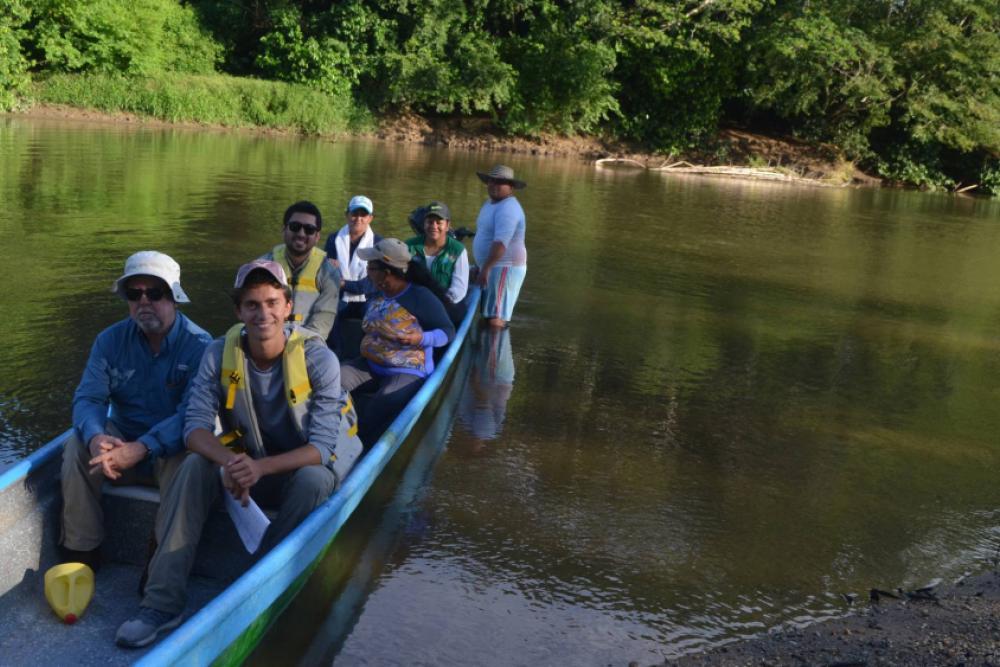
Embracing the Classics to Inform Policymaking for Public Education
For her senior thesis, Emma Treadwayconsiders how the basic tenets of Stoicism — a school of philosophy that dates from 300 BCE — can teach students to engage empathetically with the world and address inequities in the classroom.

Creating A Faster, Cheaper and Greener Chemical Reaction
One way to make drugs more affordable is to make them cheaper to produce. For her senior thesis research, Cassidy Humphreys, a chemistry major with a passion for medicine, took on the challenge of taking a century-old formula at the core of many modern medications — and improving it.
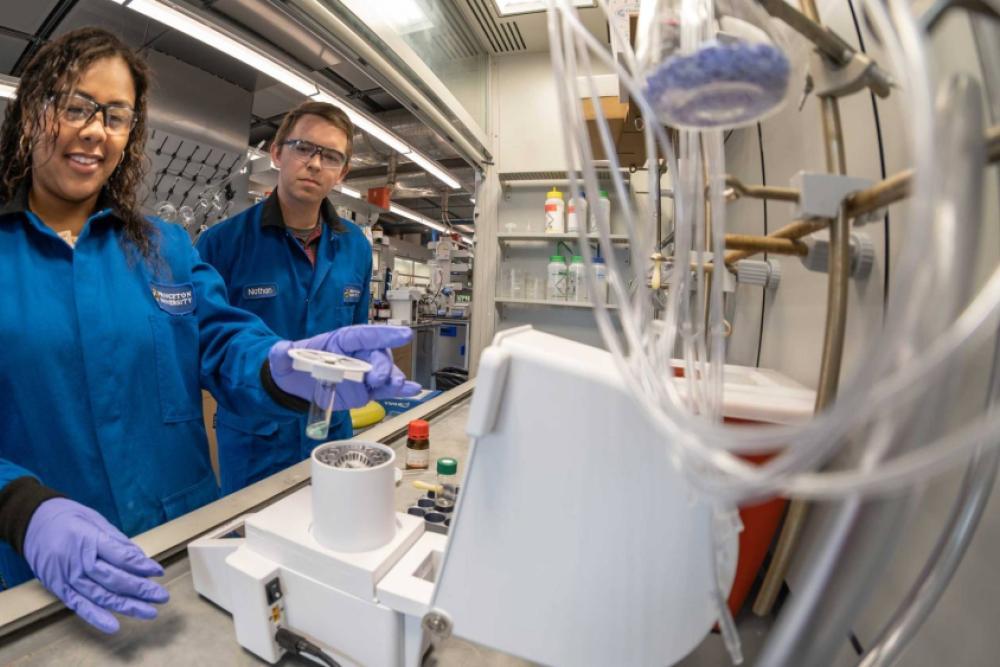
The Humanity of Improvisational Dance
Esin Yunusoglu investigated how humans move together and exist in a space — both on the dance floor and in real life — for the choreography she created as her senior thesis in dance, advised by Professor of Dance Susan Marshall.

From the Blog
The infamous senior thesis, revisiting wwii: my senior thesis, independent work in its full glory, advisers, independent work and beyond.

The Senior Thesis
From the outset of their time at Princeton, students are encouraged and challenged to develop their scholarly interests and to evolve as independent thinkers.
The culmination of this process is the senior thesis, which provides a unique opportunity for students to pursue original research and scholarship in a field of their choosing. At Princeton, every senior writes a thesis or, in the case of some engineering departments, undertakes a substantial independent project.
Integral to the senior thesis process is the opportunity to work one-on-one with a faculty member who guides the development of the project. Thesis writers and advisers agree that the most valuable outcome of the senior thesis is the chance for students to enhance skills that are the foundation of future success, including creativity, intellectual engagement, mental discipline and the ability to meet new challenges.
Many students develop projects from ideas sparked in the classes they’ve taken; others fashion their topics on the basis of long-standing personal passions. Most thesis writers encounter the intellectual twists and turns of any good research project, where the questions emerge as they proceed, often taking them in unexpected directions.
Planning for the senior thesis starts in earnest in the junior year, when students complete a significant research project known as the junior paper. Students who plan ahead can make good use of the University's considerable resources, such as receiving University funds to do research in the United States or abroad. Other students use summer internships as a launching pad for their thesis. For some science and engineering projects, students stay on campus the summer before their senior year to get a head start on lab work.
Writing a thesis encourages the self-confidence and high ambitions that come from mastering a difficult challenge. It fosters the development of specific skills and habits of mind that augur well for future success. No wonder generations of graduates look back on the senior thesis as the most valuable academic component of their Princeton experience.
Navigating Colombia’s Magdalena River, One Story At A Time
For his senior thesis, Jordan Salama, a Spanish and Portuguese major, produced a nonfiction book of travel writing about the people and places along Colombia’s main river, the Magdalena.

Embracing the Classics to Inform Policymaking for Public Education
For her senior thesis, Emma Treadwayconsiders how the basic tenets of Stoicism — a school of philosophy that dates from 300 BCE — can teach students to engage empathetically with the world and address inequities in the classroom.

Creating A Faster, Cheaper and Greener Chemical Reaction
One way to make drugs more affordable is to make them cheaper to produce. For her senior thesis research, Cassidy Humphreys, a chemistry major with a passion for medicine, took on the challenge of taking a century-old formula at the core of many modern medications — and improving it.

The Humanity of Improvisational Dance
Esin Yunusoglu investigated how humans move together and exist in a space — both on the dance floor and in real life — for the choreography she created as her senior thesis in dance, advised by Professor of Dance Susan Marshall.

From the Blog
The infamous senior thesis, revisiting wwii: my senior thesis, independent work in its full glory, advisers, independent work and beyond.

Princeton Correspondents on Undergraduate Research
Senior Thesis
It’s only the defining project of your Princeton career. No pressure.
Seasonal Series: An Interview with Eric Ahn

In the spirit of upcoming senior thesis deadlines, I wanted to interview a senior currently working on their thesis. As an underclassman that doesn’t have to worry about any form of independent work yet and a COS BSE major, one of the only majors exempt from the senior thesis requirement, I’ve always been curious about the thesis writing process and what a BSE senior thesis entails. As a part of our Seasonal Series, I am excited to present my interview with Eric, as he shares his ORFE senior thesis, his interest in finance, and his advice for rising seniors.
Share this:
- Share on Tumblr

Enhance your Research with Princeton’s Coin Collection
Students at Princeton are fortunate to have access to one of the largest collections of coins anywhere in the United States. Made up of roughly 115,000 items, the collection includes coins, paper money, medals, and other tokens covering almost the entire history of human money— in fact, the university has coins minted in the 6th century BC by Croesus, who is credited with inventing the first system of gold and silver currency. The university’s collection serves many purposes. For example, you may have been in a class which has gone down to Firestone C Floor to look at coins from the time and place you were studying. The coins are also used for exhibitions and workshops. I’m writing here to explain to you how you can use these coins to do great research.
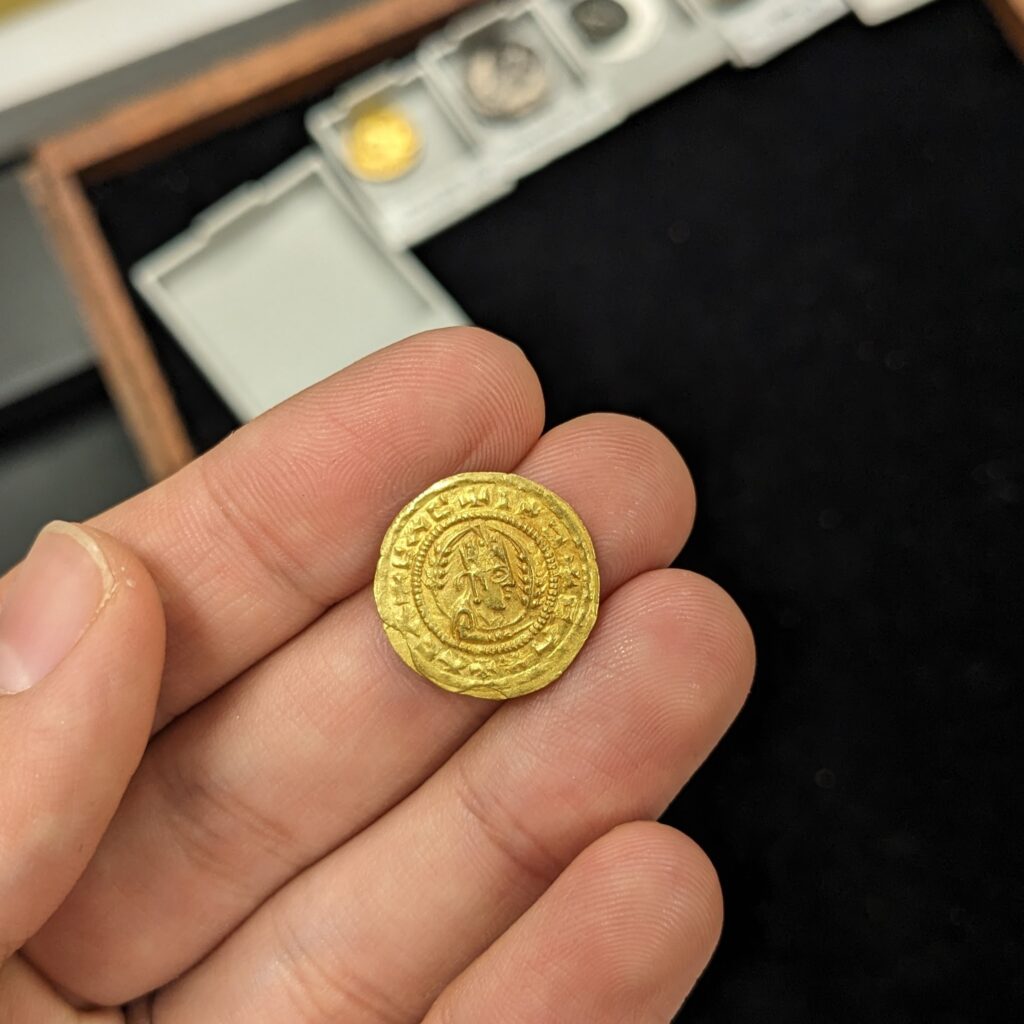
Yours truly holding a 1500 year-old coin in Firestone Library
Research and Foreign Languages
One of the major differences between the A.B. and B.S.E. courses of study at Princeton is that A.B. students are required to take (or test out of) at least four semesters of a language class. Studying a foreign language is, therefore, an essential part of studying the humanities at Princeton. There are many good reasons for studying a foreign language (besides simply needing to fulfill the language requirement)— perhaps you want to live or study in a different country, you might envision some professional advantages from knowing a foreign language, or you simply see studying languages as a new way to connect with others. Many Princeton alumni have successfully put their language skills to use in these sorts of pursuits. I’d like to offer another reason in addition to these: studying a foreign language at Princeton can prepare you to do exceptional research.
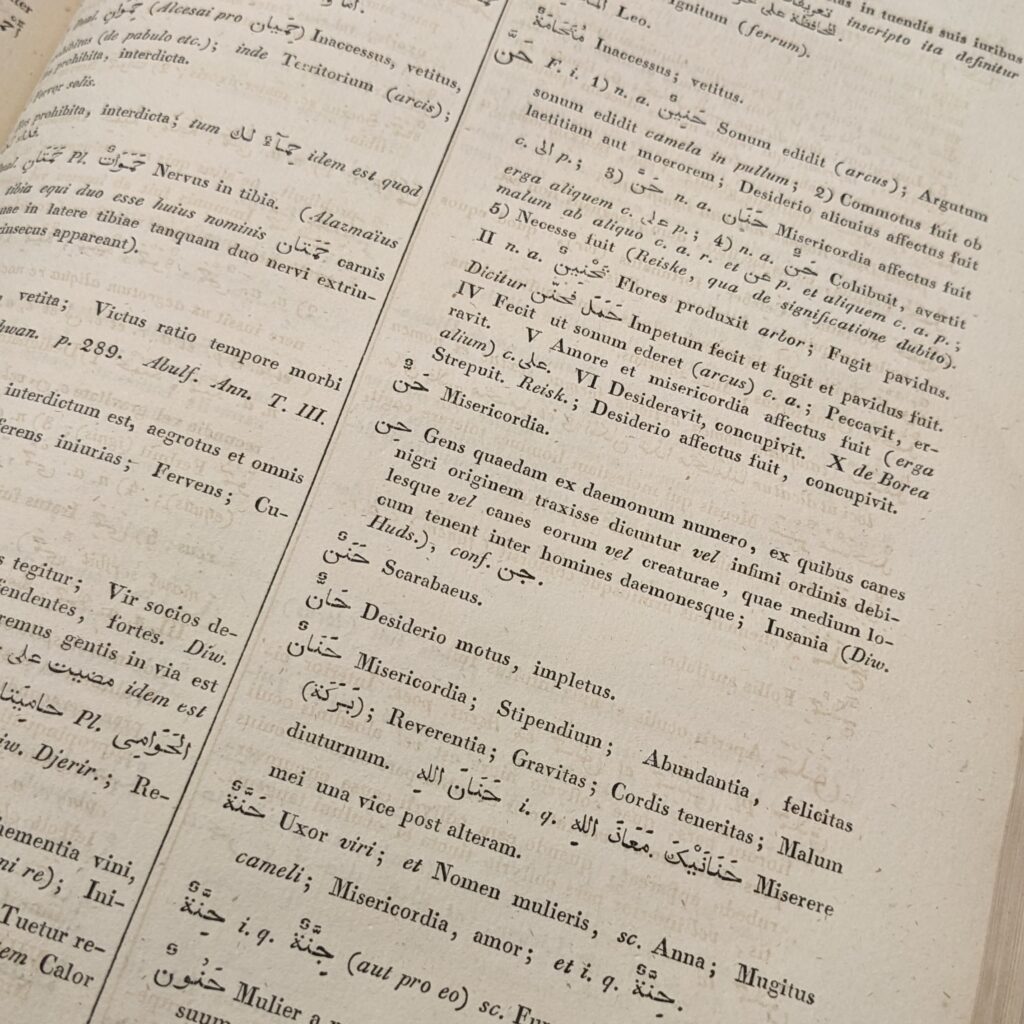
A manuscript of an Ethiopic Synaxarion in Special Collections
How to Tackle Research Topics “Beyond Your Depth” as an Undergraduate

When doing research as an undergraduate, sometimes the work you are doing and topics you study may be very familiar to you, other times you may be totally unfamiliar with what is going on. Maybe you even have some previous experience but the topic of the project is way above anything you’ve done before—you might be working with a physics professor on something really advanced like quantum field theory or condensed matter, which you have never taken a class on and are expected to now work on and understand what’s going on during your project. This can happen a lot in any field, not just STEM, where your professor may have spent years studying something that you are expected to contribute to after having taken maybe a few classes in it, if that. Some professors may work more often with graduate students, so they may assume that you know “basic” things about your field that you as an undergrad have just encountered for the first time: you could be working with an Art History professor who focuses on Late Antiquity, and they start throwing around terms and common symbols that you aren’t able to easily recognize.
Regardless of the circumstances, this situation comes up a lot in undergraduate research. The fortunate thing is that tons of professors are willing to work with students who have no prior experience in the subject, but you still have to wrestle with “catching up” as you try to somewhat understand anything that you’re actually doing. Here are some tips to try to get acclimated with difficult, unfamiliar topics that may be well above your current depth as an undergraduate.
How to use a Reference Room
Most people probably know Trustee Reading Room as that large room with big glass windows on the first floor of Firestone, where you go when you want a really quiet study space. Perhaps you’ve recently studied for midterms or worked on a paper in its sacred silence. Maybe you’ve wondered if there’s more to Trustee than simply providing a quiet atmosphere for study. The answer to that question is: yes, there is. It is the primary reference room of Firestone library– and if you read to the end of this article you will learn how to make the most of this tremendous resource.

Trustee Reading Room in Firestone Library has many reference works
Wright Library: An Under-utilized Resource for Students
When I first walked through the doors of Theodore Sedgwick Wright Library at Princeton Theological Seminary (PTS) on a sweltering September day a few weeks ago, I was struck by three things: the great size of the library, the small number of students there, and its remarkably-strong air conditioning. As I set my things down and cooled off in a quiet study area, I began to work on an assignment for one of my classes. My gratitude for the engineers who designed the building’s cooling system was quickly superseded by my admiration for those who worked together to produce the largest theological library in America and the second largest in the world after the Vatican Library in Rome.
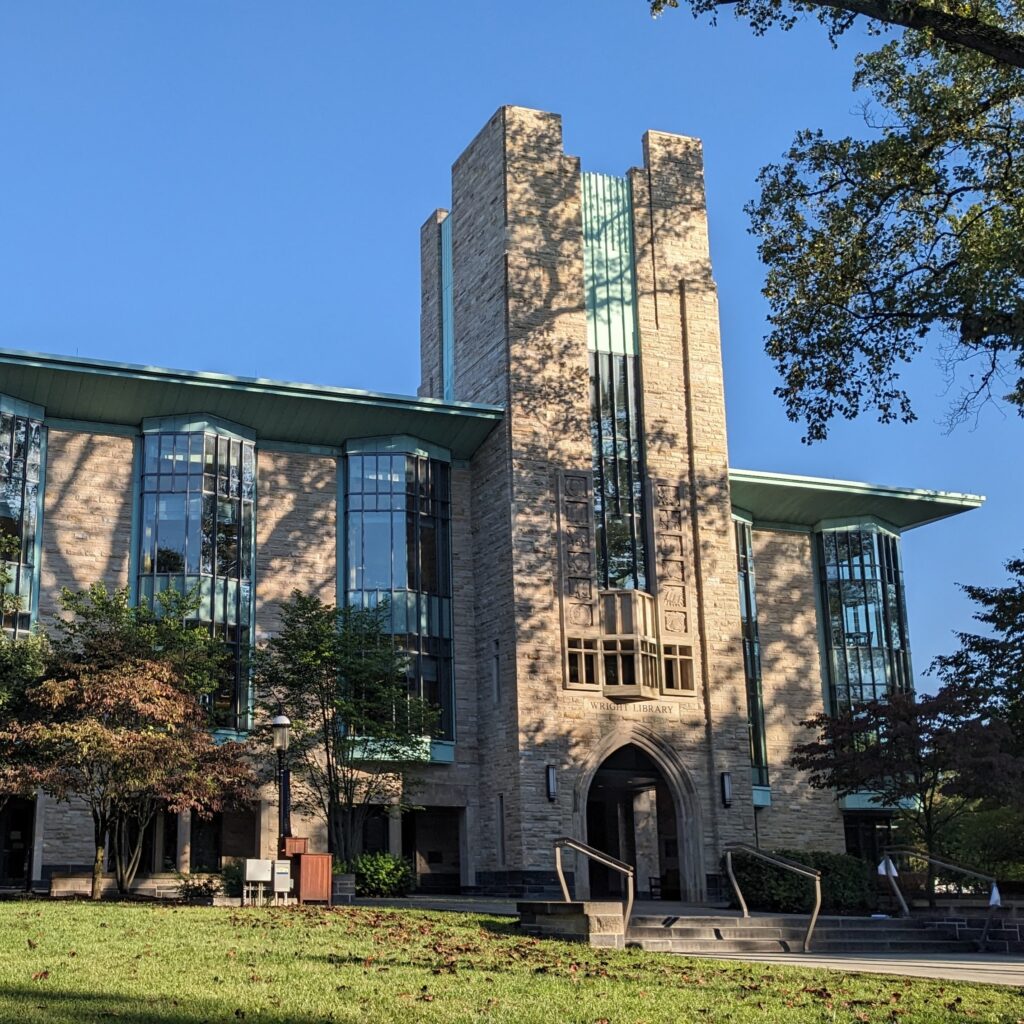
Theodore Sedgwick Wright Library is the main library at Princeton Theological Seminary .
How to Prepare for a Research Presentation
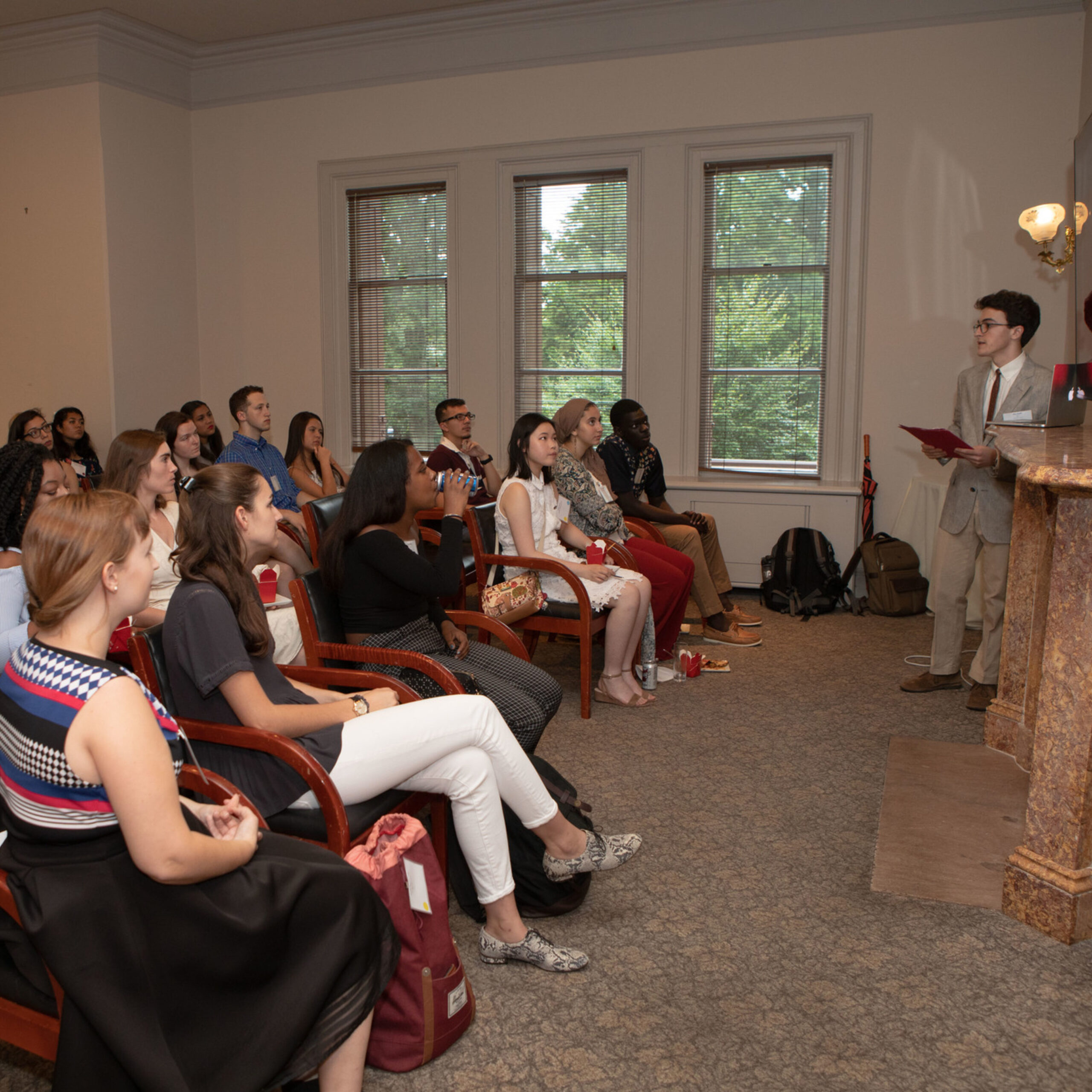
Imagine that you’ve been working on a research project for months. Now you’re standing in front of a crowd of professors, some of which probably know more about your topic than you do. If you do research working in an academic department, it can be a stressful experience if you have to eventually present your work to that department. Trying to talk about what you’ve done with your own adviser can be enough sometimes, and showing work that you may not be 100% comfortable with for a whole crowd of professors is a whole new level of daunting. They all have years of experience and may know more about aspects of your presentation than you do, so trying to seem like you know what you’re talking about while possibly being asked questions far out of your depth may seem impossible for an undergraduate to do.
Nonetheless, whether it’s theses, JPs, internships, or summer projects, all undergraduates here are going to find themselves in this position. So how do you do it?
Effortless Perfection at Princeton: The “Perfect” Thesis is Really Hard Work
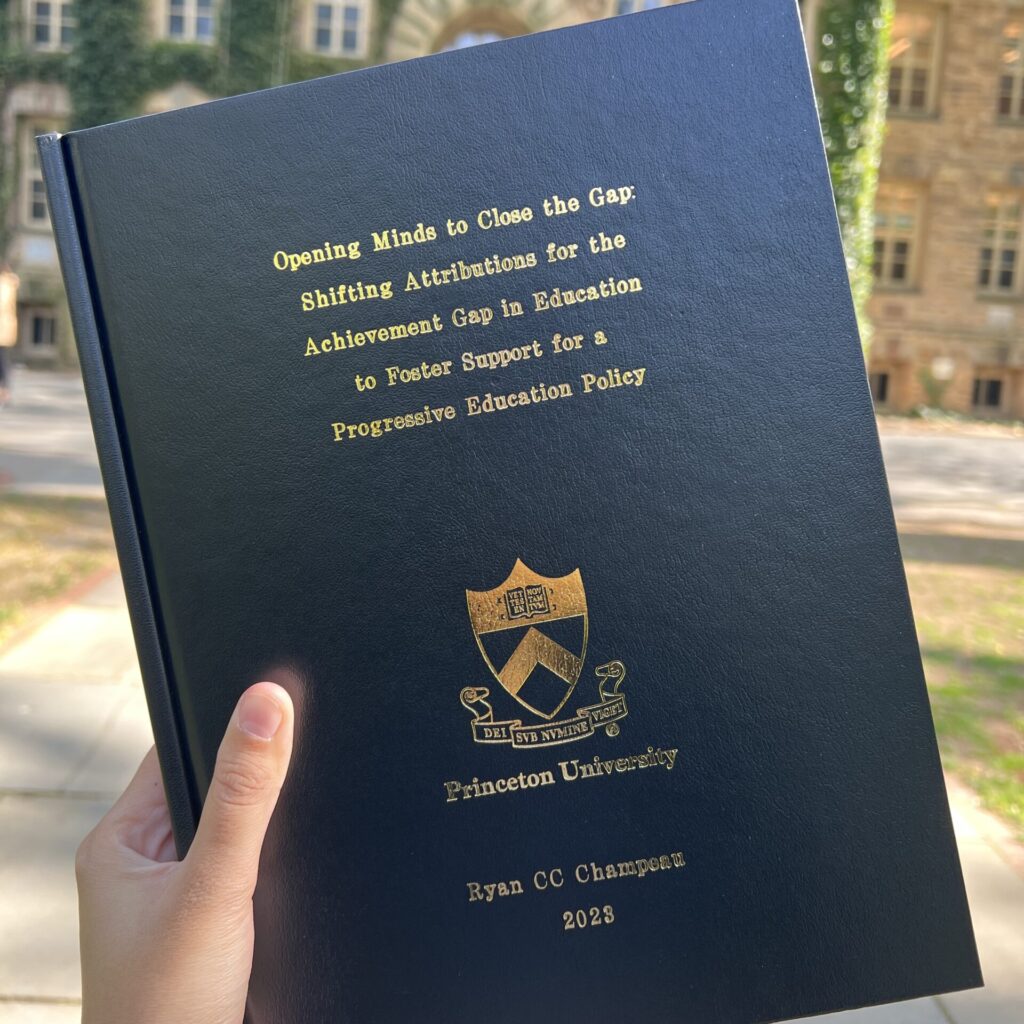
My final senior thesis!
I’ve always loved reading through senior thesis titles and thinking “Wow, that’s clever,” “That’s genius,” “I wonder how they came up with that.” The senior thesis, which many seniors refer to as a full-blown novel, is supposed to be a senior’s finest work and proudest possession. It looks impressive in its black book with gold font. It is 115 pages. It has fancy acknowledgments. As a first-year/sophomore, and even as a high schooler on tour, I was in awe at how seniors could create such a perfect paper. It isn’t until now that I know the answer: hard work.

Writing a Senior Honors Thesis & Graduating With High/Highest Honors
Undergraduates are encouraged to take advantage of all the exciting and groundbreaking research taking place here in the UCD Psychology Department.
Graduating with Honors requires a qualifying GPA. The GPA cutoffs represent the top 8-16% of UCD students in the College of Letters & Science. Check the most recent GPA cutoffs here .
To graduate with High Honors or Highest Honors, you must complete the following steps.
- Check that you meet the GPA criteria for Honors in the College of Letters & Science.
- Find a faculty sponsor
Psychology 194HAHB W18.pdf
- Submit your thesis
HonorsCoverSheet.pdf
- How do I find a faculty sponsor?
- A faculty sponsor can be any faculty member in the Psychology Department. See a complete list, along with faculty research interests here . Here are some ideas about who to ask: - If you are a research assistant , ask your Principal Investigator (PI) - Consider PSC courses that you loved and who taught them - Read about faculty research interests and approach a faculty member who shares your interests
- How do I get units for my thesis?
- Writing an Honors thesis is a year-long commitment, and these courses (6 units total) account for the work you dedicate to your thesis. PSC 194HA and 194HB are taken separately during two quarters of your senior (or final) year.
- I don't meet the Honors criteria. Can I still write a thesis?
- If you have a potential faculty sponsor, then maybe. - You and your potential sponsor should discuss your research interests, why you desire to do write a thesis, and the level of commitment involved to determine if a thesis is right for you. - If you and your sponsor agree to proceed, you would earn units via PSC 199, instead of PSC 194HA/HB. - If you do not do a thesis, check out the Undergraduate Research Center (URC) for ideas about other ways to present your research, such as the Undergraduate Research Conference.
- What kind of research does a thesis involve?
- To obtain High or Highest Honors, you must complete an original empirical investigation designed and executed by you. - It is more than a literature review - It should emulate a scientific journal article (e.g. the APA journal) - Collaboration is permitted, but you must be the first author and primary investigator - Only one person can gain credit for a single thesis - Your thesis should be primarily your contribution and ideas - Using a grad student's existing project is not appropriate - Basing a new experiment on existing work is permitted, but must how evidence of your original input and ideas.
- Honors vs. High/Highest Honors
- What is the difference between Honors, High Honors, and Highest Honors? - Students can graduate with honors based solely on their GPA. Check the most recent GPA cutoffs here . - High or Highest Honors is based on the quality of your thesis, see below - If a thesis is unacceptable, or if no thesis is submitted, and you meet the Honors GPA, you will earn Honors.
- Who will be reading my thesis?
- Your faculty sponsor and a committee of other Psychology faculty will evaluate your thesis. The Honors thesis advisor will administer the review of your thesis.
- When is my thesis due and how do I submit it?
- Your thesis is due no later than the last day of instruction of the quarter you filed to graduate. Follow these submission instructions: - Save your thesis as a PDF. The file name should be [Last Name]HonorsThesis.pdf (e.g. GarciaHonorsThesis.pdf). - Complete a Honors Thesis Cover Sheet (visit Forms above) and save as a PDF. The file name should be [Last Name]CoverSheet.pdf (e.g. GarciaCoverSheet.pdf). Your sponsor’s comments and recommendation should be sent separately by your sponsor directly to Joy Geng ( [email protected] ). - Submit both your thesis and cover sheet via email to the Honors thesis advisor, Joy Geng at [email protected]
- How will my thesis be graded?
- Each thesis is read and evaluated by a committee of Psychology faculty at the end of the quarter in which you filed to graduate. The committee will apply objective evaluation criteria to all submitted theses, and they will also consider your sponsor’s recommendation. Attributes of a Highest Honors Thesis: - Well-written with a clearly described problem that is addressed throughout the thesis - Ample evidence of original work in the form of new data collection and/or new analyses addressing a problem in the literature - A statistical approach suitable for the problem at hand - Sufficient quality of data and sample size to show convincing positive or negative effects, with many appropriate controls - The data should provide clear and unambiguous support for the main conclusions in the discussion - Findings reported in context of relevant literature - Final product should be at least 70% ready for submission to a respected low- to mid-impact journal in your field - Sample theses that received Highest Honors are available online here: 2006; 2011. Attributes of a "High Honors" Thesis: - Some of the “Highest Honors” thesis qualities remain true, but not all. - Thesis addresses an interesting and novel problem but some relevant control conditions are lacking, thereby complicating interpretations - Evidence of new data collection and/or analyses but insufficient in quality or sample size, thereby complicating interpretations - Analyses make use of appropriate statistical techniques some of the time - The data supports some aspects of the interpretation but not all - Findings sometimes reported in context of relevant literature, but other work may be missing or overlooked - Final product should be compelling and novel, but may not be ready for publication any time soon Not High/Highest Honors Quality - Significant Flaws - No evidence of original data collection and/or analyses - Poorly defined problem with minimal controls and analyses to address it - Insufficient data quality or sample size to address the problem in any meaningful way - Misunderstanding of issues basic to the field that renders the thesis difficult to interpret and problematic - Final product is not a passable thesis
- Further Questions
- The advising staff and the thesis advisor can help with additional questions - Contact an academic advisor - Contact Dr. Joy Geng, thesis advisor Additional samples are available in the Advising Office in 101 Young Hall.

COMMENTS
My senior thesis was based on experiment, which in turn was based on a really crazy idea. Rounding up equipment and building the prototype consumed most of the term; then it literally blew up a few hours into the first trial run. ... Wᴇʟᴄᴏᴍᴇ ᴛᴏ ʀ/SGExᴀᴍs - the largest community on reddit discussing education and student ...
aogoremaster. Maybe this is the right place? Question on undergrad theses. I am still in my undergraduate years, but my school offers an Honors Thesis class where you're able to write your senior thesis with a mentor by your side. I would be too dumb for words not to take advantage of such an opportunity that would give me a writing sample ...
The Writing Center has Senior Thesis Tutors who will read drafts of your thesis (more typically, parts of your thesis) in advance and meet with you individually to talk about structure, argument, clear writing, and mapping out your writing plan. If you need help with breaking down your project or setting up a schedule for the week, the semester ...
Before coming to Yale, I thought a thesis was the main argument of a paper. I quickly learned that an undergraduate thesis is about fifty times harder and fifty pages longer than any thesis arguments I wrote in high school. At Yale, every senior has some sort of senior requirement, but thesis projects vary by department. Some departments require students to do a semester-long
The senior thesis is typically the most challenging writing project undertaken by undergraduate students. The writing guides below aim to introduce students both to the specific methods and conventions of writing original research in their area of concentration and to effective writing process. ADDITIONAL RESOURCES FOR SENIOR THESIS WRITERS
A senior thesis in literature, on the other hand, will likely involve studying a movement, trope, author, or theme, and your sources will involve a combination of fiction, historical context, literary criticism, and literary theory. At many schools, a thesis ranges from 80 to 125 pages. At other universities, as few as 25 pages might fill the ...
Every year, a little over half of Harvard's senior class chooses to pursue a senior thesis. While the senior thesis looks a little different from field to field, one thing remains the same: completion of a senior thesis is a serious and challenging endeavor that requires the student to make a genuine intellectual contribution to their field of interest.
2. Reflect on Courses and Extracurriculars. Upon reflecting on the "obvious", you should also think back to the classes that you enjoyed most at Princeton and the extracurriculars that you participated in. Your senior thesis is an opportunity to bring together your academic interests, your leadership interests, maybe even your friendships ...
Senior Thesis. A senior thesis is more than a big project write-up. It is documentation of an attempt to contribute to the general understanding of some problem of computer science, together with exposition that sets the work in the context of what has come before and what might follow. In computer science, some theses involve building systems ...
It is much better to work for fifteen to twenty minutes and get something done, however small, than to keep thinking for five hours that you should be working and be so daunted that you get nothing done and then feel discouraged, demoralized, and guilty. 6. Employ the S-O-S strategy: specific, observable steps.
Integral to the senior thesis process is the opportunity to work one-on-one with a faculty member who guides the development of the project. Thesis writers and advisers agree that the most valuable outcome of the senior thesis is the chance for students to enhance skills that are the foundation of future success, including creativity, intellectual engagement, mental discipline and the ability ...
Senior Thesis Guide. Human Evolutionary Biology. rev. 10/28/2020. 2020-2021. Senior Thesis Tutor/Advisor: Dr. Sarah E. Kessler, Preceptor; [email protected] Dr. Kessler runs the tutorials and meetings associated with HEB 99a and 99b. She is available to answer general thesis questions and to provide support to thesis writers (in addition ...
This post will start with one of the first steps of the thesis process: finding an adviser. In 2019, Social Sciences Correspondent Andrea Reino listed some advice on how to find the right adviser (see here ). Her advice is comprehensive, so I really suggest checking it out and then coming back here for a few more details and a new perspective.
Integral to the senior thesis process is the opportunity to work one-on-one with a faculty member who guides the development of the project. Thesis writers and advisers agree that the most valuable outcome of the senior thesis is the chance for students to enhance skills that are the foundation of future success, including creativity, intellectual engagement, mental discipline and the ability ...
D. Mar 27, 2014. #4. I did one. Didn't get anything for it. In retrospect, probably a lot more work than it was worth. If you were going to go on and get a masters or phd where you'd have to do a thesis, it might be good experience. If you're going to get an MD, probably extra work without benefit. Mar 27, 2014.
The senior thesis, which many seniors refer to as a full-blown novel, is supposed to be a senior's finest work and proudest possession. It looks impressive in its black book with gold font. It is 115 pages. It has fancy acknowledgments. As a first-year/sophomore, and even as a high schooler on tour, I was in awe at how seniors could create ...
To graduate with High Honors or Highest Honors, you must complete these steps. 1. Check that you meet the GPA criteria for Honors in the College of Letters & Science. 2. Find a faculty sponsor. 3. Take PSC 194HA and 194HB. During this time, conduct your research and write your thesis. 4.